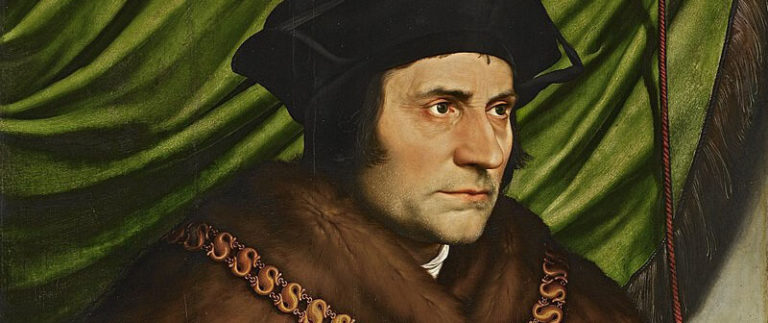The following remarks were delivered Nov. 14 by Professor James O’Hara, recipient of the St. Thomas More Society’s “Man for All Seasons Award” in 2019.
When Monsignor Farmer telephoned that I had been selected for this annual honor, I was astonished. While I am indeed a law school graduate and a member of the Maryland Bar, I am not a lawyer in any meaningful sense. I am an academic. I do not give legal advice. I have never had clients. I have never been “stiffed” for a fee.
I began law school at night when I was 50 years old and graduated at 54. Obviously, no legal career begins at that age. So while my classmates were interested in practical questions, I was more focused on legal philosophy, and in the way the law evolved historically.
After graduation, I began to read biographies of Supreme Court Justices. What began as a hobby became a passion, and in time, I became a history guru. And that, I suppose, is what brings me here tonight.
I am profoundly grateful for this honor, and I thank you from the bottom of my heart.
Tonight, we are really here to honor St. Thomas More, whose example of fidelity to the law and to the faith is a model for any Catholic lawyer. So I have tonight two observations and insights which may be useful as we consider his life and death.
Observation 1: In modern times, we have a new kind, a new mode, of sainthood. For over a thousand years, most saints were relatively obscure. They were known and remembered in local communities, in their own religious orders, and in a few cases, as with kings and queens, to whole nations.
But beginning around the fifteenth century, advances in transportation and communications introduced the occasional saint, whose Christian witness became known far outside the usual borders of Christianity and Catholicism. Some of these figures where actually celebrity saints.
In our own day, I think of Mother Theresa, whose sanctity led to the Nobel Prize, and who some regarded as a saint in her own lifetime, by millions — many of whom were not even Catholic.
More than 100 years ago, we can point to Father Damien, universally admired for his commitment to the lepers of Molokai.
In a sense, Thomas More was the first celebrity saint. He was, of course, well known in England. But his diplomatic travels, his extensive writings, his paramount prominence as a Humanist, his friendship with Erasmus and Holbein and other leaders and scholars made Thomas an international figure of great renown. His death and the reason behind it shook the whole world profoundly.
Even today, 500 years later, biographies are still written and read, a play about his life was a runaway best seller and is still in print after 50 years, and a movie about Thomas More won Academy Awards.
Thomas More — the first celebrity saint.
Observation 2: The modern biographers of More all stress his brilliance, his rapid rise to power and influence from an unpretentious family of origin, his subtle and sophisticated legal skills. They dramatize his principled stand when he refused to take an oath acknowledging the Kihg as head of the Church in England.
However, most of the biographers frankly admit that they did not understand his position. One author actually holds that Thomas More died to uphold an obscure point of law — an abstraction.
This point of view, it seems to me, does not comprehend the real Thomas More. As a young man, while still a student, he was a boarder in a Carthusian Charterhouse. While there he adopted some of the prayerful routines and penitential practices of the hermits. All his life, under his ceremonial finery, he wore a hair shirt.
His prayer life was contemplative, even mystical. He read the Divine Office daily. (We still have his Book of Hours with his hand written marginal comments). He knew the Psalms as well as he knew the law. He led daily prayer for his family. And he left behind simple and direct prayers for his own guidance.
Thomas was no nominal member of the Faith. He lived in constant awareness of God’s presence. When faced with the great challenge of his life —to sign or not to sign that oath — there was no hesitation.
The fact that every bishop in England except one had signed it, the fact that most of the priests and academics and lawyers had signed it, the fact that his wife and family did not understand — all of this— did not perturb him.
He must do what the God of his experience asked of him. For Thomas More, that was no abstraction. God was his Father and his Friend.
His conscience was shaped by his nearness to God. That made is decision, not easy, but clear.
Erasmus called Thomas “the only genius in England.” Samuel Johnson said, “he was the person of greatest virtue these islands ever produced.”
St. Thomas More, patron of judges, St. Thomas More, patron of lawyers, Pray for us.


